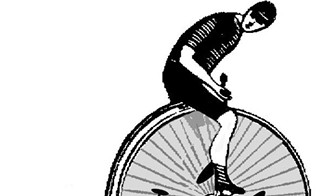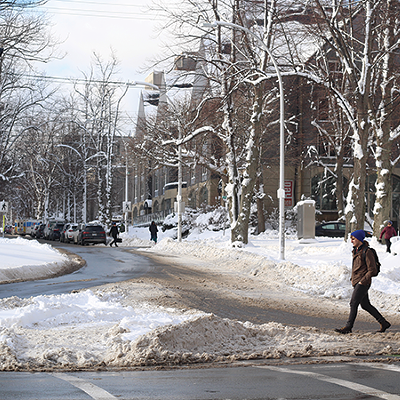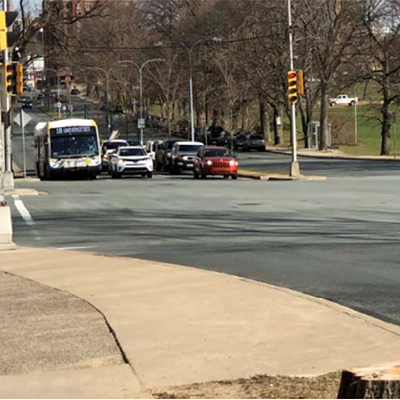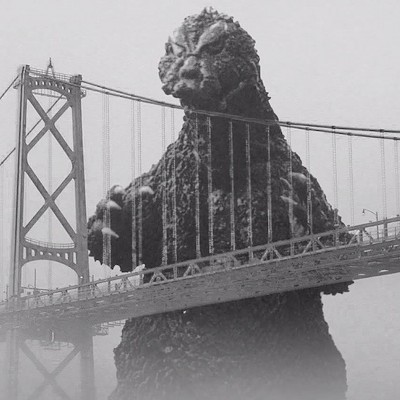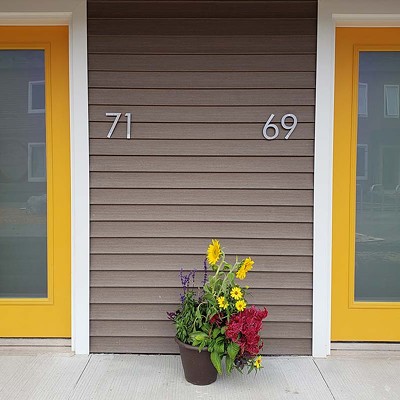"What are you guys doing?" asks a woman from inside her parked car on Spring Garden. More than a hundred cyclists, some dressed as skeletons, sex workers and bears, are blocking her from pulling out of her pit-stop at Timmy's.
"We're going for a bike ride," answers one of the Canadian Olympians. It's Critical Mass, Halloween edition, and the answer is typical of the critical mass movement: slightly enigmatic, almost evasive, yet simple enough. A big ole bike ride, last Friday of every month, lots of people, howling good fun.
This Critical Mass is a pretty big one by Halifax standards, it being Halloween and also one month after the triple ticket incident. On the September ride three cyclists were nailed with traffic infraction tickets around Oxford Street and Quinpool Road.
"It was a left turn," recalls Scott MacPhee, who was fined $135.75 for his participation in September's event. He's been a Halifax masser since 2004. "We don't usually make left turns."
MacPhee says a paddy wagon shot past the 65 bikes in the mass that evening and blocked the road, holding traffic at a standstill for 20 minutes. "They asked us who our leader was," he says. He was near the front and stepped forward to explain the Critical Mass's organizational structure, or lack thereof.
Critical Mass started as large informal bike rides in 1970s Stockholm, which were later named after the Beijing cycling practice of "massing up" at intersections and crossing in unison, for protection from Beijing drivers' complete indifference to human life. Even when Critical Mass became a movement 20 years later in San Fransisco, it kept its dedication to being disorganized, with no leaders or members. Now, the event is held in more than 300 cities around the world, a celebration of self-propelled bipedalism and a cry for better cycling infrastructure.
"If you had leaders they could get picked out of the crowd by police," MacPhee explains of the diffuse structure. As it turns out, that is exactly what happened to him. "I think they nailed me for speaking up."
His ticket reads: "Failing to ride bicycle on extreme right of highway."
"I didn't break any law," MacPhee says. "I was in the process of making a left turn as per the Canadian Cycling Handbook." He is a certified Canadian Cycling Association (Can-Bike) Instructor---that's the same course bike cops take and sometimes instruct.
MacPhee acknowledges that "technically mass is illegal, because you are supposed to be single file," and the bike mass takes up an entire lane of traffic. But the beauty is that cops can't ticket the whole mass. "Most times police don't even come." MacPhee was told that in this case, a driver called in a complaint about cyclists holding up traffic.
The lords of the road being dissatisfied, somebody had to pay. MacPhee says it won't be him. He's challenging the ticket in traffic court and he expects to win, but he hopes for much more. "I would like the Nova Scotia Motor Vehicles Act to be changed," he says.
It may sound nitpicky, but MacPhee points to a serious contradiction between our Act and the Canadian Cycling Handbook, which is the gold standard for safe cycling in Canada. It instructs cyclists to stay one metre away from the curb and parked roadside vehicles. This distance saves cyclists from "the big door prize," an opening car door straight to the ribs. Yet our provincial traffic act wants cyclists on the "extreme right."
At a more fundamental level, MacPhee hopes for better dialogue between cyclists and the police. Whether it's cycling in general or Critical Mass as an event, he sees no reason to criminalize people practicing and celebrating sustainable active transportation.
Twenty cyclists at a recent meeting to discuss how to prevent such criminalization agreed that mass is a celebration rather than a protest, MacPhee says. "In Halifax, sometimes some anarchist wannabes ride all over the road and sidewalk yelling at cars with no helmets on, but that aggressive behaviour turns people off---if we piss off the general public we'll be looked at as just a fringe group."
But because most of the riders at mass are respectful and kind to car drivers, the event has grown steadily in the five years MacPhee has been participating. "It's getting bigger every year," he says. "Its power is just in having that many people---kids, seniors, teens, hardcore and utilitarian cyclists. We don't want to hold up traffic; we just want to get the word out on the need for better infrastructure."

